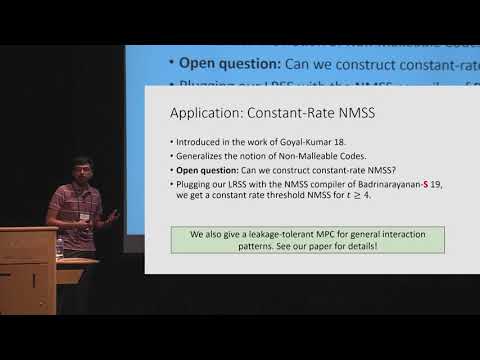CryptoDB
Stronger Leakage-Resilient and Non-Malleable Secret Sharing Schemes for General Access Structures
| Authors: | |
|---|---|
| Download: |
|
| Abstract: | In this work we present a collection of compilers that take secret sharing schemes for an arbitrary access structure as input and produce either leakage-resilient or non-malleable secret sharing schemes for the same access structure. A leakage-resilient secret sharing scheme hides the secret from an adversary, who has access to an unqualified set of shares, even if the adversary additionally obtains some size-bounded leakage from all other secret shares. A non-malleable secret sharing scheme guarantees that a secret that is reconstructed from a set of tampered shares is either equal to the original secret or completely unrelated. To the best of our knowledge we present the first generic compiler for leakage-resilient secret sharing for general access structures. In the case of non-malleable secret sharing, we strengthen previous definitions, provide separations between them, and construct a non-malleable secret sharing scheme for general access structures that fulfills the strongest definition with respect to independent share tampering functions. More precisely, our scheme is secure against concurrent tampering: The adversary is allowed to (non-adaptively) tamper the shares multiple times, and in each tampering attempt can freely choose the qualified set of shares to be used by the reconstruction algorithm to reconstruct the tampered secret. This is a strong analogue of the multiple-tampering setting for split-state non-malleable codes and extractors.We show how to use leakage-resilient and non-malleable secret sharing schemes to construct leakage-resilient and non-malleable threshold signatures. Classical threshold signatures allow to distribute the secret key of a signature scheme among a set of parties, such that certain qualified subsets can sign messages. We construct threshold signature schemes that remain secure even if an adversary leaks from or tampers with all secret shares. |
Video from CRYPTO 2019
BibTeX
@article{crypto-2019-29897,
title={Stronger Leakage-Resilient and Non-Malleable Secret Sharing Schemes for General Access Structures},
booktitle={Advances in Cryptology – CRYPTO 2019},
series={Lecture Notes in Computer Science},
publisher={Springer},
volume={11693},
pages={510-539},
doi={10.1007/978-3-030-26951-7_18},
author={Divesh Aggarwal and Ivan Damgård and Jesper Buus Nielsen and Maciej Obremski and Erick Purwanto and João Ribeiro and Mark Simkin},
year=2019
}

